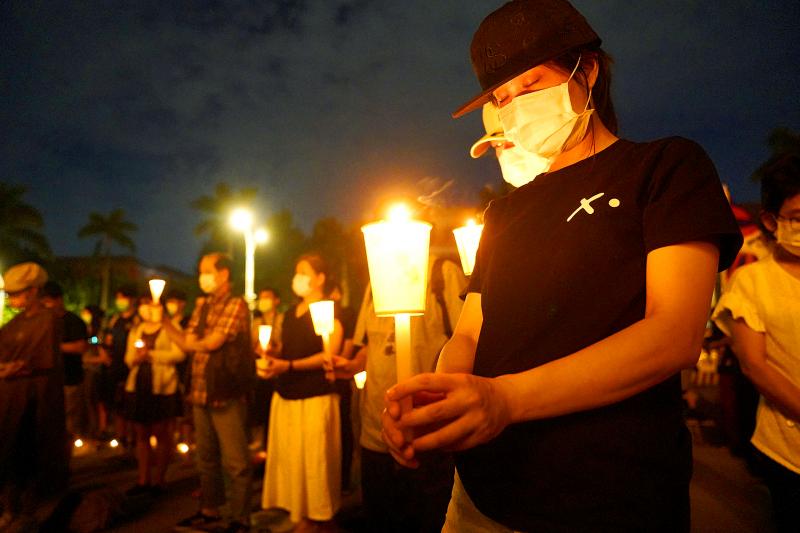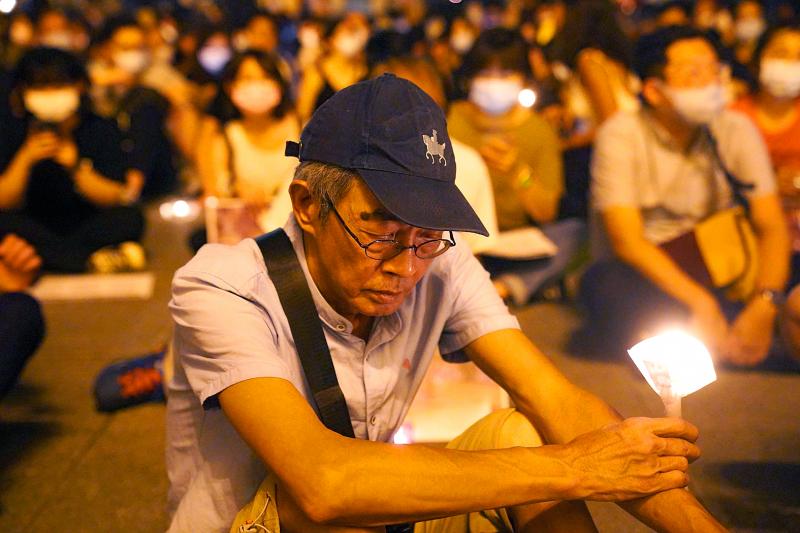Local officials and public figures across party lines yesterday commemorated the 31st anniversary of the Tiananmen Square Massacre while highlighting democratic values and the importance of learning from history.
President Tsai Ing-wen (蔡英文) posted on Facebook a photograph of a calendar page for June 4, saying that every year, one day in China is “forgotten.”
“While Taiwan had similar issues, we rediscovered these forgotten days, because we no longer need to keep historical truths hidden, allowing us more time to ponder the future,” Tsai wrote in Chinese.

Photo: CNA
She expressed her hope for no part of the world to have certain days removed from memory and said: “A free Taiwan supports the freedom of Hong Kong.”
Legislative Speaker You Si-kun (游錫堃) expressed regret for all those who were killed in Beijing on June 4, 1989, as well as for pro-democracy protests in Hong Kong.
“We must cherish our democracy and also concern ourselves with those who do not yet enjoy democracy,” You told reporters.

Photo: Liao Chen-huei, Taipei Times
He called on other democratic nations to jointly pressure Beijing into enacting reforms and allowing self-determination for Chinese.
Separately, former president Ma Ying-jeou (馬英九) on Facebook repeated his annual call for Beijing to face history and make amends for the massacre.
Freedom, democracy, human rights and the rule of law are Taiwan’s core values, Ma wrote, adding that Beijing pursuing the concepts would bring Taiwan and China closer, and help resolve its conflict with Hong Kong.

Photo: CNA
On Wednesday, Chinese Nationalist Party (KMT) Chairman Johnny Chiang (江啟臣) also urged Beijing to face the ghost of its past, and answer the calls for political reforms, democracy and liberty that the massacre represents.
The KMT supports the promotion of democracy, liberty and human rights, and it would not be blind, deaf, or mute about what it knows is the truth, Chiang said, adding that the party continues to believe in the goals it stated in 1989 of democratizing politics and liberalizing the economy.
At a Taipei City Council meeting yesterday, Taipei Mayor Ko Wen-je (柯文哲) said that the massacre was a tragedy of the modern era, and that he believed China would inevitably embrace democracy.
The Taipei City Government has been in talks with the Shanghai branch of China’s Taiwan Affairs Office, with both sides leaning toward holding this year’s Taipei-Shanghai twin-city forum via teleconference, Ko said, adding that the choice of software was still being discussed.
Suddenly halting the forum, which has been held for more than a decade, would set back relations, Ko said, adding that a platform must exist for mutual goodwill to be expressed.
In a radio interview yesterday, Hong Kong dissident and bookstore owner Lam Wing-kei (林榮基) said that he supports Taiwan’s stance of doing more than saying.
Lam’s bookstore, Causeway Bay Books (銅鑼灣書店) — named after the bookstore he managed in Hong Kong — opened in Taipei on April 25.
China is set on “reclaiming” Hong Kong, a goal evident since the beginning of anti-extradition bill protests, Lam said.
Taipei has helped nearly 300 Hong Kong pro-democracy activists without loudly trumpeting its efforts, which is smart, Lam said, expressing the hope that the government would allow Hong Kongers to stay in Taiwan for longer than six months.
Lam yesterday afternoon attended a news conference held by the New Power Party to mark the anniversary and its support for Hong Kong.
Hong Kongers should protect themselves and leave the territory if they feel that it is not safe there, and stay in Taiwan to save their energy for the long-term fight against China, he said.
Additional reporting by Shen Pei-yao, Chung Li-hua and Wu Su-wei

PREPAREDNESS: Given the difficulty of importing ammunition during wartime, the Ministry of National Defense said it would prioritize ‘coproduction’ partnerships A newly formed unit of the Marine Corps tasked with land-based security operations has recently replaced its aging, domestically produced rifles with more advanced, US-made M4A1 rifles, a source said yesterday. The unnamed source familiar with the matter said the First Security Battalion of the Marine Corps’ Air Defense and Base Guard Group has replaced its older T65K2 rifles, which have been in service since the late 1980s, with the newly received M4A1s. The source did not say exactly when the upgrade took place or how many M4A1s were issued to the battalion. The confirmation came after Chinese-language media reported

The Taiwanese passport ranked 33rd in a global listing of passports by convenience this month, rising three places from last month’s ranking, but matching its position in January last year. The Henley Passport Index, an international ranking of passports by the number of designations its holder can travel to without a visa, showed that the Taiwan passport enables holders to travel to 139 countries and territories without a visa. Singapore’s passport was ranked the most powerful with visa-free access to 192 destinations out of 227, according to the index published on Tuesday by UK-based migration investment consultancy firm Henley and Partners. Japan’s and

A Ministry of Foreign Affairs official yesterday said that a delegation that visited China for an APEC meeting did not receive any kind of treatment that downgraded Taiwan’s sovereignty. Department of International Organizations Director-General Jonathan Sun (孫儉元) said that he and a group of ministry officials visited Shenzhen, China, to attend the APEC Informal Senior Officials’ Meeting last month. The trip went “smoothly and safely” for all Taiwanese delegates, as the Chinese side arranged the trip in accordance with long-standing practices, Sun said at the ministry’s weekly briefing. The Taiwanese group did not encounter any political suppression, he said. Sun made the remarks when

BROAD AGREEMENT: The two are nearing a trade deal to reduce Taiwan’s tariff to 15% and a commitment for TSMC to build five more fabs, a ‘New York Times’ report said Taiwan and the US have reached a broad consensus on a trade deal, the Executive Yuan’s Office of Trade Negotiations said yesterday, after a report said that Washington is set to reduce Taiwan’s tariff rate to 15 percent. The New York Times on Monday reported that the two nations are nearing a trade deal to reduce Taiwan’s tariff rate to 15 percent and commit Taiwan Semiconductor Manufacturing Co (TSMC, 台積電) to building at least five more facilities in the US. “The agreement, which has been under negotiation for months, is being legally scrubbed and could be announced this month,” the paper said,